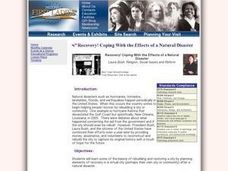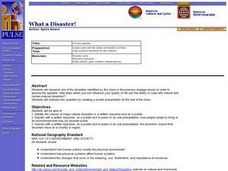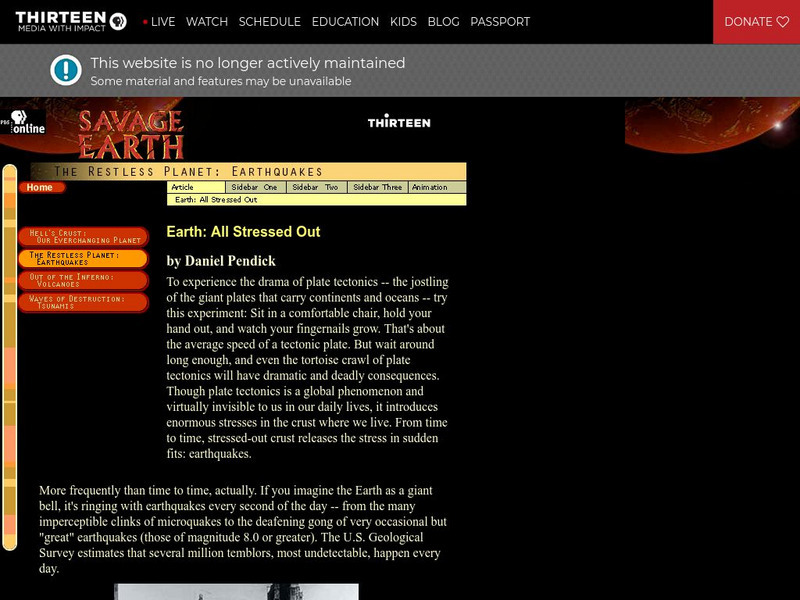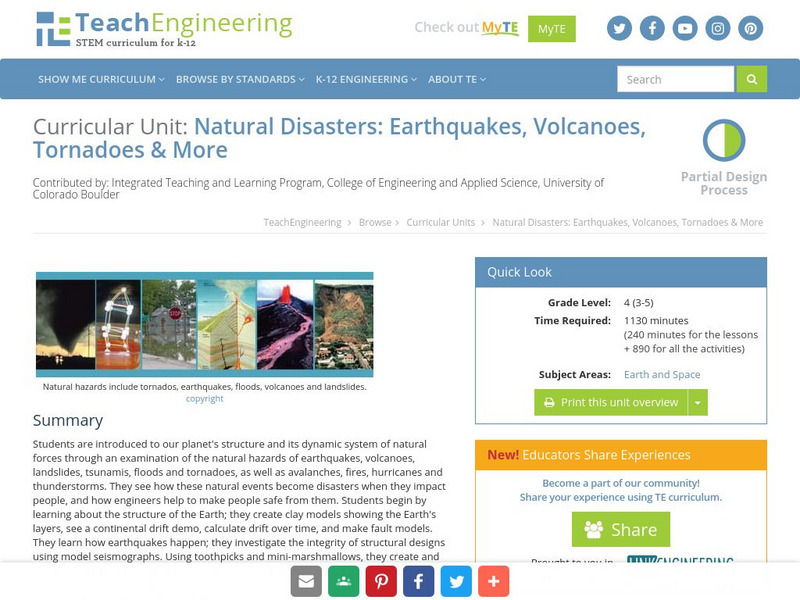Curated OER
Tsunami
Students examine what causes tsunamis and why they all behave differently. For this tsunami lesson students complete a group activity after viewing a video.
Curated OER
Shake, Rattle and Roll
Students compare the weathering of materials. in this weathering lesson, students experiment with the chemical and physical weathering of different materials. Students use salt and water as an example of how weathering occurs.
Curated OER
Bhutan, the Last Shangri-La: Sandwich Squash: How the Himalayas Were Formed
Pupils create and record a model of mountain formation. They identify major mountain building formations. Students understand how the Himalaya Mountains were formed, why they are located near Bhutan, and why they are becoming larger.
National First Ladies' Library
Recovery! Coping with the Effects of a Natural Disaster
Students explore natural disasters and the devastation caused by them. Using specified websites, learners examine how people rebuild after a disaster. In groups, they design and rebuild a community and conclude by writing an essay...
Curated OER
OCEAN TSUNAMI
Students research the concept of a tsunami in detail and the implications of its effect upon a seashore is considered. The causes of a tsunami are investigated and compared with each other.
Curated OER
Effects Of Natural Disasters On Environment
Students investigate the concept of how natural disasters effect the environment. They conduct research using a variety of resources. They are given a scenario that needs a defensive speech. Students take a position and defend it by...
Curated OER
Crossword
In this crossword worksheet that focuses on natural disasters, students find the vertical word in the colored squares by filling in the right words in ten lines in the horizontal boxes. Answers appear at the bottom of the worksheet.
Curated OER
Polishing the Petoskey
Students select a stone and polish it. Throughout the process they demonstrate an understanding of rocks and fossil formation.
Curated OER
The Effects of Volcanoes
Learners use the internet to research the effects of volcanoes. They create a chart showing the negative and positive aspects that a volcanoe can bring to an area. Using PowerPoint, they create a presentation showing the negative and...
Curated OER
What a Disaster!
Students identify the causes of major natural disasters in a written response and on a poster. They explain with a written response, on a poster and to peers in an oral presentation, how people adapt to living in an environment that may...
Curated OER
Polishing the Petoskey
Students polish a Petoskey stone to show how to make an attractive rock display. In this polishing rocks lesson plan, students use sand paper and polishing materials to polish a rock and remove the rock dust. This is to display a nice...
Other
Digital Library for Earth System Education: Living in Earthquake Country
An inquiry unit that teaches students about the how and why earthquakes cause damage and about life in earthquake country. Students specifically learn about: earthquake damage, where earthquake occur, earthquake patterns, seismic waves,...
US Geological Survey
U.s. Geological Survey:the Great M9.2 Alaska Earthquake of March 27, 1964
A description of the earthquake in Prince William Sound, Alaska in 1964. Links to isoseismal map, earthquake damage photos, and seismogram of the earthquake.
PBS
Wnet: Thirteen: Savage Earth: The Restless Planet Earthquakes
Discussion of liquefaction and landslides which are two of the many effects of earthquakes.
Other
Vibrationdata: Alaska Earthquake 1964
Time, date, and size of the Alaskan 1964 earthquake. Photos of the damage caused by the quake and the tsunami, location of the epicenter, and a description of the landslides.
University of Washington
University of Washington: 1964 Alaskan Earthquake
Alaska is part of the Pacific Ring where there are many earthquakes. Basic information about the 1964 Alaskan earthquake is provided, including landslides and liquefaction information, an embedded link to the text of a radio announcement...
University of Washington
University of Washington: Physics of Tsunamis
The civil engineering department presents the physics of a tsunami. The topics addressed: what does "tsunami" mean; how do tsunamis differ from other water waves; how do earthquakes generate tsunamis; how do landslides, volcanic...
US Geological Survey
Usgs: Natural Hazards Programs: Lessons Learned for Reducing Risk [Pdf]
This site provides links to articles about natural disasters such as volcanoes, earthquakes, landslides, floods, etc.
TeachEngineering
Teach Engineering: Natural Disasters
Students are introduced to our planet's structure and its dynamic system of natural forces through an examination of the natural hazards of earthquakes, volcanoes, landslides, tsunamis, floods and tornados, as well as avalanches, fires,...
Ready
Ready
Explore the Ready website for an overview of how families and businesses can prepare for emergencies, threats, and disasters by building kits, making plans, and staying informed. Find safety information about biological threats,...
TeachEngineering
Teach Engineering: Naturally Disastrous
Students are introduced to natural disasters, and learn the difference between natural hazards and natural disasters. They discover the many types of natural hazards - avalanche, earthquake, flood, forest fire, hurricane, landslide,...
Curated OER
National Park Service: Geological Hazards
Learn about geohazards such as mudslides, earthquakes, and outburst floods that can be found in National Parks.
Science Struck
Science Struck: A Complete List of Natural Disasters
Explains what a natural disaster is and provides a list of every type along with a short description of each.
Cosmo Learning
Cosmo Learning: Engineering Geology
A collection of video lectures from a course introducing students to the basics of engineering geology. Webpage includes forty lectures from a professor at the National Programme on Technology Enhanced Learning. Lectures vary in length...



